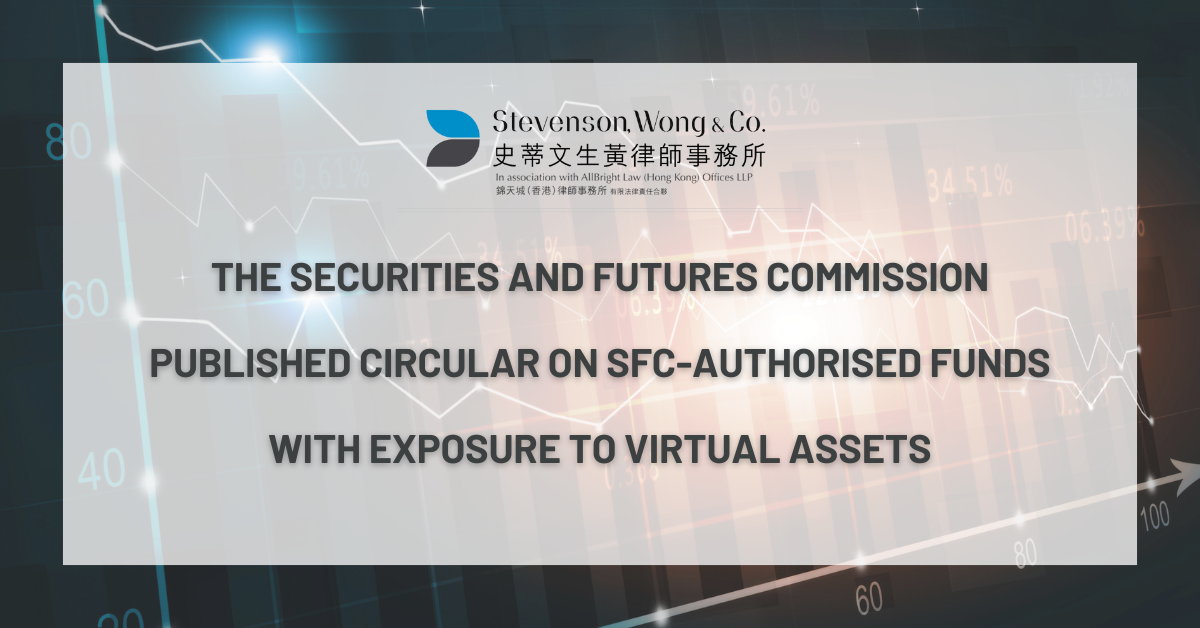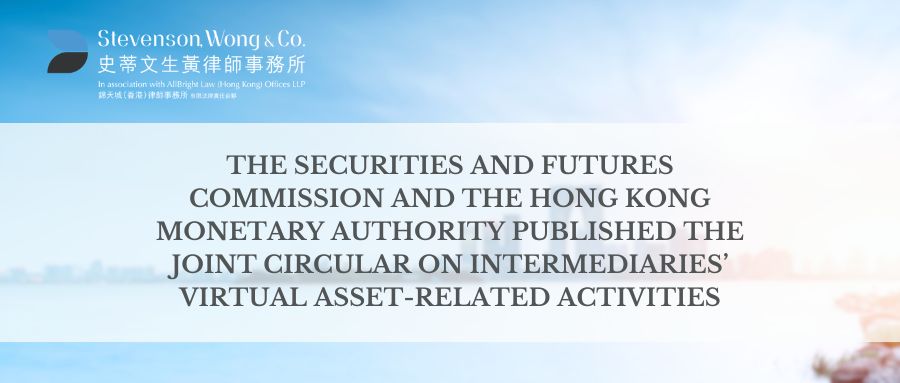Introduction
On 8 February 2024, the Financial Services and the Treasury Bureau (the “FSTB”) published a consultation paper (the “Consultation Paper”) inviting public feedback on its proposed legislative regulation of over-the-counter (“OTC”) trading of virtual assets (“VA”).

The proposed reforms aim to introduce a licensing regime for providers of VA OTC services under the Anti-Money Laundering and Counter-Terrorist Financing Ordinance (Cap. 615) (“AMLO”). The proposal can be divided into four main parts: (1) the scope and coverage of the regime; (2) the proposed regulations to be imposed on licensees; (3) the licence period and transitional arrangements; and (4) the powers of the licensing authority in regulating the regime.
Legislative Proposals
Scope and coverage of the regime
The FSTB notes that regulating the VA OTC industry requires regulating any person involved in the marketing and operation of said business in Hong Kong. They propose that such involved persons must obtain a licence issued by the Commissioner of Customs and Excise (the “CCE”) under their proposed licensing regime. They propose that a VA OTC business shall be defined as:
(a) by way of business, provision of service of spot trade of any VA;
(b) irrespective of whether the service is provided through a physical outlet (i.e. including ATMs) or other (e.g. digital) platforms; and
(c) explicitly excluding the operation of a virtual asset trading platform (“VATP”) as already covered under the VATP licensing regime.
The FSTB also notes that operators of VA trading services may also provide temporary custody/escrow service for their client’s VA as part of the transaction process. The FSTB welcomes public feedback on whether temporary custody/escrow service as part of the transaction process should be covered by the proposed regulatory regime, and whether there should be dedicated regulatory requirements for such temporary custody/escrow service.
With the intention for effective supervision and monitoring, the FSTB proposes that license applicants will be restricted to locally incorporated companies with a permanent place of business in Hong Kong, or companies incorporated elsewhere but registered in Hong Kong under the Companies Ordinance (Cap. 622). The CCE will also consider all relevant matters in deciding whether an applicant is fit and proper.
Noting the regulations already in place for licensed corporations, authorised institutions and licensed stablecoin issuers, the FSTB believes it appropriate for these entities to be exempt from the licensing regime should they provide VA OTC services.
Proposed regulations imposed on licensees under the regime
Under the regime, licensees are allowed to perform spot trade of VA for any money or vice versa in their course of business, but will only be allowed to perform remittance of exchange proceeds on specified conditions. To mitigate money laundering/terrorist financing (“ML/TF”) risks, licensees will only be allowed to transfer VA relevant to a transaction from their registered wallets to a client wallet owned or controlled by the client. Furthermore, VA-to-VA trading services are prohibited unless with a VATP licence. Licensees will also be required to observe the anti-money laundering/counter-terrorist financing (“AML/CTF”) requirements as set out in the AMLO when it comes to customer due diligence and record-keeping.
FSTB notes that the licensing regime will be limited to trading purposes only and other services, including any form of advisory, referral, or offering of VA derivates or other financial products will not be permitted under the licensing regime.
With the intention of having a more stringent standard of supervision to offer adequate investor protection, VA OTC licensees will not be permitted to offer services in respect of tokens that not accessible by retail investors on at least one SFC-licensed VATP or stablecoins not issued by issuers licensed by the Hong Kong Monetary Authority (“HKMA”).
FSTB also proposes that further safeguards be put in place due to the tech-savvy and highly speculative nature of VA. In particular, FSTB considers it appropriate for VA OTC licensees to be subject to a set of robust regulatory requirements to ensure that they have the capacity and know-how to operate the VA OTC business properly.
Further regulatory requirements also reference those enlisted in the VATP and money service operators (“MSOs”) regime. For further details relating to the scope of such requirements, please refer to paragraph 2.18 of the Consultation Paper.
As part of the CCE’s duty to regulate, licence will only be granted when all specified requirements are met. It would subsequently be prohibited for any person to actively market a regulated VA OTC service unless licensed by CCE to conduct such service. In case of non-compliance, VA OTC licensees will be subject to disciplinary and investigative proceedings and subsequent enforcement actions, as elaborated below.
Licence period and transitional arrangements regarding the regime
The FSTB proposes that under the licensing regime, a successful applicant will be granted a licence of two years, renewable for two years upon application and to the satisfaction of CCE. The FSTB also suggests a transition period of six months immediately before the commencement of the regime to facilitate transition of the existing VA OTC operators. Pre-existing VA OTC service providers will be allowed to continue their operations until the end of the six-month transition period, on condition that they submit within the first three months a licence application to CCE and subject to the proposed arrangements by the FSTB:
Option 1: Pre-existing VA OTC service providers that do not submit a licence application to CCE within the first three months of the commencement of the transition period must close down their business by the end of the fourth month of the commencement of the transition period; or
Option 2: Applicants that meet the requirements by the CCE will receive an interim “deemed licence” granted in the interim permitting them to continue their operations beyond the transitional period and until a final determination of the licence applications is made by the CCE.
Powers of the licensing authority, enforcement and sanctions
The FTSB suggests that the CCE will be provided the power to supervise AML/CTF conduct of VA OTC licensees, enforce statutory and regulatory requirements, and commence enforcement action where necessary. They will also be empowered to impose and/or add to, vary or modify existing licensing conditions. The FSTB also proposes that consideration be given to provide the CCE with additional powers to prevent access to websites or digital platforms of VA OTC operators involved in unlicensed or fraudulent activities.
The FSTB further suggests imposing strict penalties and sanctions for unlicensed VA OTC services to deter ML/TF activities, such as making it an offence to carry out a regulated VA OTC service without a licence or issuing an advertisement of such. Furthermore, non-compliance with AML/CTF requirements could result in a fine of $1 million, imprisonment for two years, and administrative sanctions. Licensees committing any offences in respect of fraudulent and misleading activities of VA OTC will bear the consequences as currently listed in the provisions under the AMLO.
To incorporate the licensing regime into the current AML/CTF regulatory system, the FSTB further proposes that Part 6 of AMLO be expanded to cover appeals against future decisions to be made by CCE in implementing the VA OTC licensing regime.
Analysis and takeaways
Earlier last year, a number of fraud cases associated with alleged VATPs have highlighted the urgency and demand in bringing VA OTC services within the statutory regulatory remit to ensure that sufficient investor protection is provided for.
In this long-awaited legislative proposal, the FSTB proposes to introduce a new licensing regime for providers of VA OTC services. It follows the already established VATP licensing regime and regulatory system for MSOs and aims to prevent further fraudulent or ML/TF activities from happening in the VA OTC service industry. It remains to be seen whether the proposed legislation would be perceived as conducive to tackling the rising VA fraud cases in Hong Kong.
“Please contact our Partner Mr. Rodney Teoh for any enquiries or further information.
This news update is for information purposes only. Its content does not constitute legal advice and should not be treated as such. Stevenson, Wong & Co. will not be liable to you in respect of any special, indirect or consequential loss or damage arising from or in connection with any decision made, action or inaction taken in reliance on the information set out herein.”




